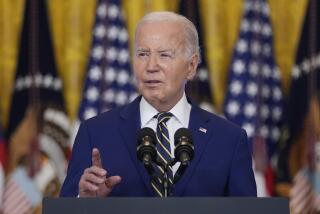Military Rollout Leaves Gays in Old Quandary
- Share via
SAN FRANCISCO — At military bases across the country, troops mobilized for America’s new war are saying goodbye to spouses and sweethearts with lingering embraces and teary kisses.
Unless they’re gay.
Homosexuals reporting for possible combat are bound by the “don’t ask, don’t tell” mandate to keep their sexual orientation to themselves.
“There are moments that bring this policy into sharper focus. This is one of those moments,” says Dixon Osburn, executive director of the Servicemembers Legal Defense Network, formed to help gays in the military.
After the Sept. 11 attacks, the Pentagon suspended certain types of administrative discharges, but not the ban on serving as an openly gay member of the armed forces.
Historically, discharges for homosexuality have decreased during times of war, according to the Center for the Study of Sexual Minorities in the Military based at UC Santa Barbara.
For instance, in the three years before 1966, the Navy discharged more than 1,600 sailors each year for homosexuality, says center director Aaron Belkin, quoting figures researched by Randy Shilts, who wrote “Conduct Unbecoming,” and Alan Berube, author of “Coming Out Under Fire.” But as military involvement in Vietnam increased, the number dropped to as low as 461 in 1970.
A Pentagon spokesman did not respond to calls and e-mails requesting comment.
“You can bleed, die and fight for your country when there’s an external enemy. It seems unfortunate that America tends to feed on itself and harm itself when there’s no external threat,” says Richard Watson, a former Navy submarine officer who was discharged after he told his commanding officer he was gay.
Several countries allow openly gay troops to serve, including Canada, Israel, Australia and Britain.
Supporters of “don’t ask, don’t tell” say allowing gays to serve openly would undercut morale and unit cohesion. A heterosexual soldier, for example, might not want to share a foxhole with a homosexual.
Charles Moskos, a Northwestern University sociology professor who studies the armed forces and helped draft “don’t ask, don’t tell” for the Clinton administration, says the policy tried to steer a middle course.
“If you let open gays in then you do have problems of personal privacy violations--’You will have to live with this gay guy’--and if you go back to the old order, which was the true witch-hunting, well, that was just repressive and they got stigmatized,” Moskos says. “It’s a compromise, and that’s why Congress passed it.”
After the Sept. 11 attacks, a number of gays who had been kicked out of the armed forces got in touch with the Servicemembers Legal Defense League to see if there was any chance of reenlisting, Osburn says. There wasn’t.
But Watson, the former submarine officer, understands.
“Would I go back to defend this country and to serve? You bet,” he says. “Even with all its pitfalls and all of its social ills, this is still the greatest place in the world.”
More to Read
Sign up for Essential California
The most important California stories and recommendations in your inbox every morning.
You may occasionally receive promotional content from the Los Angeles Times.










